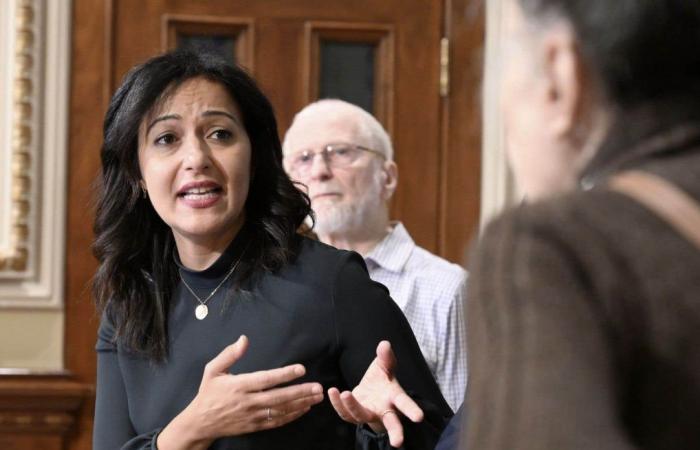A few days ago, the MP for Mercier, the solidarity-based Ruba Ghazal, announced her intention to block the far right of Jordan Bardella and the National Rally during the legislative elections in France. In front of the Mont-Royal metro station, she distributed leaflets from the New Popular Front, thus encouraging French people living in the territory to vote for the left alliance. Criticisms from the ruling class in Quebec were quick to come.
On Platform X, Minister Christopher Skeete called his position “foreign interference.” With his eternal sense of nuance, Éric Duhaime denounced the “communist international” (read: the Communist International). To this concert of conservative voices was added that of Roland Lescure, Emmanuel Macron’s minister and deputy representing the French in North America: “I can’t imagine myself interfering in a Quebec or Canadian election. » He then called in the name of the center for us to “repel the extremes”. Often used by the President of the French Republic himself, this argument serves here to align Québec solidaire, to better disqualify it, with Jean-Luc Mélenchon’s La France insoumise.
These various condemnations are probably just a storm in a teacup, as there are so many in political life. Under their consensual exterior, they nevertheless reveal a “new united front” of the right. Because we are willing to be indignant about the supposed interference of a left-wing MP in the French debate; in return, we do not say a word about the importation into Quebec of new ideological categories from Europe.
Indeed, the criticisms addressed to Ruba Ghazal conceal the semantic battle currently underway among conservative columnists and essayists whose primary strategy aims to normalize and legitimize the far right and its themes among the Quebec public. If we are to believe, for example, Joseph Facal, the “frightening rise” of this political movement would essentially result from a “ridiculous media obsession” which would impose its “moralizing and guilt-inducing” reading grid. Basically, calls to prevent the far right from gaining power in France amount to moral panic.
For his part, Christian Rioux judges that the National Rally is a “populist national party”, a label that Jean-Marie Le Pen, then leader of the National Front, would certainly not have disavowed in his time. It is indisputable that Jordan Bardella marks an “evolution of the new rights” which has little to do with the fascist tendencies of the last century. However, it is simplistic and even irresponsible to believe for a single moment that the term extreme right would have no other function in public debate than to stigmatize the adversary: ”It doesn’t matter what we think of the program of the National Rally, associating it with the violent overthrow of liberal democracy is today pure fantasy. » But what should we think, precisely, of this program?
It is not because one is photogenic and clean-cut, after having swapped the brown shirt for the white shirt, that one has managed to erase the xenophobic, racist and anti-Semitic origins of one’s party. One only has to listen with a little attention to the members and representatives of the National Rally. Similarly, respecting the formal rules of the republican game does not make one a convinced democrat.
Elected president of the Second Republic in 1848, Louis-Napoléon Bonaparte committed a coup d’état three years later before establishing the authoritarian regime of the Second Empire. So, can we really declare with Mathieu Bock-Côté that the extreme right is an “absurd label”, the sign of those who “understand nothing about anything”? In his essay Totalitarianism without the gulagpublished in 2023, the author sees in wokeism and political correctness a communism pursued by other means. Conversely, he does not hesitate to declare that the extreme right would be the target and even the victim of repeated campaigns of demonization and criminalization. It would suffer a kind of tracking and even “historical violence” on the part of the media and left-wing activist associations. As for the “illiberal” tendencies of our societies, they would be observed rather on the side of the center for Bock-Côté, either in Macronism in France or Trudeauism in Canada.
In terms of violence, we could almost forget the long list that goes from the SS to the Proud Boys to the Russian skinheads. All the authors mentioned above rightly emphasize what links the new right in France to popular anger against political elites perceived as indifferent to the ordinary concerns of citizens. The Yellow Vest crisis was the most eloquent illustration of this. They forget that the National Rally also attracts those nostalgic for French Algeria, identitarians hostile to the right of the soil, those who continue to praise the benefits of colonization or who applauded the creation of the Ministry of National Identity in 2007 under the presidency of Nicolas Sarkozy.
Far from the complacency of our columnists, quick to defend this stale and moldy France, Ruba Ghazal is perhaps guilty of interference in the eyes of her parliamentary colleagues. She at least knows how to demonstrate critical discernment in the face of history in progress.






